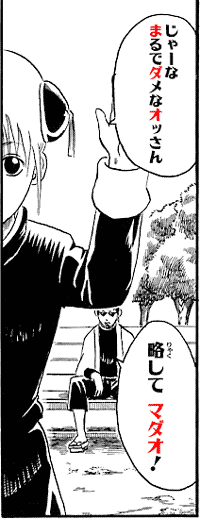In Japanese, madao マダオ is an abbreviation of marude dame na ossan まるでダメなオッさん, meaning "completely useless old man." It's not a Japanese word, actually, but a running joke used in the manga and anime Gintama 銀魂, said by Kagura 神楽 about Hasegawa Taizou 長谷川 泰三.
- jaa ne
じゃーね
[See ya later]. - marude dame na ossan
まるでダメなオッさん
Completely useless old man. - ryaku shite, madao!
略して マダオ!
Abbreviate it: MADAO!
For people who know nothing about Japanese, but watch too much anime, the exchange above may be difficult to understand linguistically for a number of reasons. Fortunately, this is a blog about explaining those reasons.
ま vs. マ
First off, you can see in Kagura's speech balloon that marude まるで is written with this thing:
- ma ま
However, the word madao looks like this:
- madao マダオ
Where's the ma ま we saw before? Shouldn't it be madao まダオ? What's going on here?
What happens is that Japanese has multiple alphabets, which aren't really "alphabets" but whatever. They are hiragana ひらがな, katakana カタカナ, and kanji 漢字.
The hiragana and katakana represent the same sounds and are interchangeable: just like lower-case and UPPER-CASE letters, except the reasons to choose one over the other are different.
In this case, ma ま is the hiragana representation of the syllable ma, while ma マ is the katakana.
The word marude まるで is spelled with hiragana because it's a common adverb, while madao マダオ is spelled with katakana because it's an abbreviation.
There are other reasons for the choice of spelling too: like dame 駄目 being spelled without kanji because dame ダメ is much simpler to write and dame だめ can be mistaken with the copula da だ. Even stylistic reasons exist.
"As if" vs. "Completely"
Next: marude まるで sometimes means "as if." So the phrase sounds like Kagura is saying:
- As if [you're] an useless old man.
It's true that marude can mean something "looks exactly like" something else, or "is practically the same" as something else. However, the word has a second meaning, which is, indeed, the adverb "completely," "thoroughly," "at all." And it's often used in negative contexts, such as the context of not being an useless old man. [まるで【丸で】 - 大辞林 第三版 via kotobank.jp, accessed 2019-03-12.]
- marude yomenai まるで読めない
Completely not able to read.- I can't read it at all!
Useless?
Lastly we have the word dame ダメ. In many cases, dame means "no." But it can also mean a whole lot of other things. See the article about dame ダメ for details. In this case specifically, it has the meaning of "being a failure." Someone who fails as a person is, well, called "useless."
- dame na hito ダメな人
Person [who] is failure.
An useless person.- Kagura said this about Hasegawa because he's become a NEET, and NEETs are often useless failures.
In case you're wondering what that na な is doing up there: it's a copulative verb. In Japanese when you have a verb before a noun you have a relative clause, which is a type of adjective.
Only verbs and the true adjectives, the i-adjectives, can come before nouns in this fashion. And those i-adjectives are kind of like verbs anyway. So words such as dame need this na な copula in order to function as adjectives.
See na-adjectives for details.
Old Man
Lastly, the word ossan オッさん doesn't literally mean "old man." It actually comes from the word ojisan おじさん, which means "uncle" in Japanese.
Just like in English "uncle" actually refer to a random "old man" who's not related by blood to you, in Japanese ossan can refer to an "old man" too.

No comments: